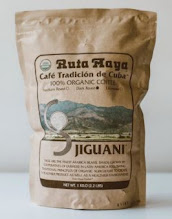TTABLOG Test: Is "JIGUANI" Primarily Geographically Deceptively Misdescriptive of Coffee?
The USPTO refused to register the proposed mark JIGUANI for coffee, finding the term to be primarily geographically deceptively misdescriptive under Section 2(e)(3). Do you know where Jiguani is? How do you think this appeal came out? In re Ruta Maya Royalty, Ltd, Serial No. 90453034 (April 14, 2023) [not precedential] (Opinion by Judge Thomas W. Wellington).
Section 2(e)(3) of the Trademark Act prohibits registration of marks that are primarily geographically deceptively misdescriptive of the identified goods or services. A mark is primarily geographically deceptively misdescriptive if all of the following conditions (“elements”) are met:
- 1. the primary significance of the mark is a generally known geographic location;
- 2. the goods do not come from the place named in the mark, but the relevant public would be likely to believe that the goods originate there; and
- 3. the misrepresentation is a material factor in the purchaser’s decision to buy the goods in question.
There was no dispute that Jiguani is a geographic location (a town in Cuba), and the applicant's coffee does not come from that location (it comes from Mexico). Applicant, however, strongly disputed whether Jiguani is a "generally known" location, as required by the first element of the test.
Applicant argues that the “vast majority of Americans have no idea where or what Jiguani is [and c]onsequently, it is almost impossible that purchasers would make a goods/place association.”5 Applicant argues that without a goods/place association, its use of JIGUANI on coffee “could not be ‘a material factor in a significant portion of the relevant consumer’s decision to buy the [coffee].”
In addition to references on applicant's packaging and at its website, the Examining Attorney submitted an excerpt from the THE COLUMBIA GAZETTEER OF THE WORLD, which states that Jiguani has a population of 21,130 and is a dairying center that also produces sugarcane, fruit, coffee, and cacao.
The CAFC in In re Societe Generale des Eaux Minerales de Vittel S.A., held that "it is necessary that the purchasers perceive the mark as a place name and this is where the question of obscurity or remoteness comes to the fore." The question for the Board, then, was "how many coffee consumers in the U.S. know that Jiguani is a town in Cuba?"
the CAFC also has advised, in In re Newbridge Cutlery Co., that "the mere entry in a gazetteer or the fact that a location is described on the internet does not necessarily evidence that a place is known generally to the relevant public."Although the Examining Attorney submitted materials showing that Cuba has a coffee industry and a particular coffee-growing region, there is no mention of Jiguani in any of these submissions. The fact that Jiguani is located within a coffee-growing region in Cuba does not necessarily translate to the town being generally known to the relevant American public.The Board concluded that there was no evidentiary basis for a finding that "there has been a significant amount of American coffee consumer exposure to Applicant’s packaging or the website. Thus, without further context or evidence, we cannot determine the extent of such exposure, if any, and whether it has had a measurable effect on consumers’ knowledge and perception of Jiguani. We also cannot assume that Applicant’s website will always have this information."
Upon review of the record, there is "not substantial evidence for the proposition that, to the relevant public, [Jiguani], is generally known." Newbridge, 113 USPQ2d 1451. Rather, Jiguani appears to be only a remote and obscure town in Cuba whose existence is generally unknown to the American consumers of coffee.
And so, the Board reversed the refusal to register.
Read comments and post your comment here.
TTABlogger comment: Never heard of it. When the packaging and website refers to Cuba, should that be more significant than the Board allows?
Text Copyright John L. Welch 2023.






3 Comments:
Since the question is misdecriptiveness, I am surprised the board didn't give more credence to the applicant's references to the town. But looking at the website, it seems clear that they name is an homage to the traditions of this region and not an indication of geographic origin, so I think this is the correct result.
I agree with the Board, I'm from Cuba and I drink coffee, I've never heard of that town, nor the town is known in Cuba as coffee producer.
This one is a headscratcher. I agree that most American consumers would think of the movie "Jumanji" when they see this at Costco or Amazon and have no idea where it is, but given the way coffee type is marketed by region, e.g., Kona, Columbian, Sumatra, etc., (and often used as an adjective such as "Kona coffee" and "Columbian coffee") I think that most consumers looking at this package would assume that the coffee was grown in Jiguani (wherever that is), and if they bought the package it would be a material consideration. What this tells me is that the first element "the primary significance of the mark is a generally known geographic location" needs to be modified when competing goods are often marketed based upon geographic location. This coffee may not have been geographically deceptively misdescribed, but it was deceptively misdescribed.
Post a Comment
<< Home